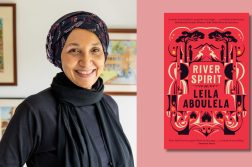Book: My Sister the Serial Killer
Author: Oyinkan Braithwaite
My Sister the Serial Killer, a debut dark thriller, written by Oyinkan Braithwaite, tells of the lives and relationship between two sisters, Korede and Ayoola. The story is set in Lagos, Nigeria, with Korede, the elder sister, as the narrator. As the bold and dark title suggests, the novel largely reflects the crime of serialised murder, an uncommon theme in African novels, and more narrowly, Nigerian fiction.
In the first chapter, we are introduced to the sisters. Korede, the older and more responsible one, who cleans up her younger sister’s mess. Ayoola, younger, beautiful, and reckless has a penchant for killing her lovers. She is also disorganised and relies constantly on the overly organised Korede who is torn between her love for her sister and her fear of doing the wrong thing. As always, Korede is overcome by the love for her sister and she finds herself drawn deeper and deeper into Ayoola’s antics, as an accomplice.
Another theme noticed as the story progresses is Korede’s low self-esteem, especially about her looks. She portrays herself as dark-skinned, with poorly apportioned facial features, and generally unattractive; unlike Ayoola, whose beauty is of the mesmerizing kind, seizing attention wherever she goes. We catch a whiff of jealousy in Korede’s tone, especially after her doctor crush, Tade, falls hopelessly in love with her younger sister. With Tade though, the jealousy gives way to genuine concern as she tries to save him from Ayoola’s murderous proclivity.
Characters like Femi, Muhtar, mother and others, although occurring largely in the background of the story, play important roles as they set the pace for Korede’s character, behaviours and choices. Femi, killed at the start of the novel, remains relevant as a ‘ghost’ whose memory haunts Korede and Ayoola, although for the latter, to a much lesser extent. Muhtar, in his comatose state is the elder sister’s confidant, and even after his unexpected ‘rise from the dead’, he serves to provide Korede’s much needed therapy sessions, although his life is much more complicated than initially presumed. Their mother, not-so-surprisingly, plays favourites and picks the alluring Ayoola over plain-faced Korede. This affects the plot in many subtle ways because she might be responsible (along with other factors, of course) for the younger sister’s sense of entitlement and the elder sister’s lack thereof.
It is beautiful to watch how the author unravels the father’s character from the beginning of the story to the end. Although ‘Daddy’ remains a ‘monster’ for the most part, towards the end, he becomes humanised and real unlike in the earlier stages of his character where he was more of an abstract form that we, the readers, assumed was the reason for Ayoola’s problems.
The bond of familial love and its implications is evident from the start of the novel, but the readers are nothing short of shocked when it is exhibited by Ayoola before the story ends. Although this ‘love’ is not expressed without a splash of self-centeredness which is her major character trait.
We find that although both sisters are criminals, we cannot help but love them even with their flaws (many readers might not find Ayoola a lot lovable though). We maybe bore a naïve hope that the sisters, especially the younger one would have a change of heart, but the author, it seems, had other plans. Nonetheless, the story brings to mind a different kind of love than what is portrayed by popular culture–love between siblings. And as quiet as this kind of love might seem, it still exerts a very strong hold on humans and makes them do things that they never thought imaginable–like being an accomplice to a murder, or series of murders.
And then the end of the book, where we realise that the story is more of a love story than a thriller, and it tells more of the bond between siblings than it does about the actual killings. Although I would have loved for Korede to have a more active voice and the motive for Ayoola’s actions more clearly defined, it would be impossible to not admit that the book is well put together, and the story, very engaging.
After all that has been said, I look forward to more literary works by the author, Oyinkan Braithwaite. And if you have not read the book, My Sister the Serial Killer, you should.
Ese Emmanuel is currently a final year student of a Nigerian university. She has an overwhelming love for books and humorously refers to reading as ‘the one true love of her life’. She believes herself to be revolutionary and can be reached via Twitter and Instagram, @_eseemmanuel.


